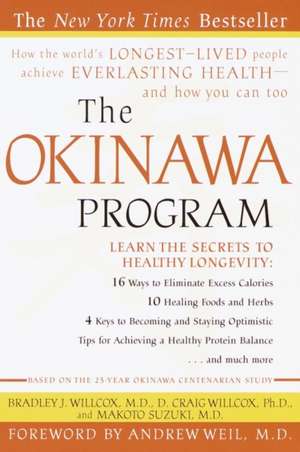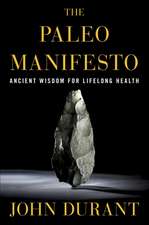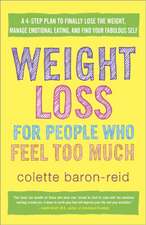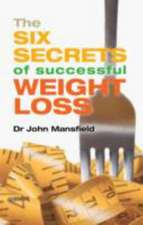The Okinawa Program: How the World's Longest-Lived People Achieve Everlasting Health--And How You Can Too
Autor Bradley J. Willcox, D. Craig Willcox, Makoto Suzukien Limba Engleză Paperback – 28 feb 2002
The Okinawa Program, authored by a team of internationally renowned experts, is based on the landmark scientifically documented twenty-five-year Okinawa Centenarian Study, a Japanese Ministry of health–sponsored study. This breakthrough book reveals the diet, exercise, and lifestyle practices that make the Okinawans the healthiest and longest-lived population in the world. With an easy-to-follow Four-Week Turnaround Plan, nearly one hundred fast, delicious recipes, and a moderate exercise plan, The Okinawa Program can dramatically increase your chances for a long, healthy life
Preț: 118.94 lei
Nou
Puncte Express: 178
Preț estimativ în valută:
22.76€ • 23.68$ • 18.79£
22.76€ • 23.68$ • 18.79£
Carte disponibilă
Livrare economică 24 martie-07 aprilie
Preluare comenzi: 021 569.72.76
Specificații
ISBN-13: 9780609807507
ISBN-10: 0609807501
Pagini: 496
Ilustrații: 25 LINE DRAWINGS
Dimensiuni: 155 x 234 x 33 mm
Greutate: 0.64 kg
Ediția:Pbk.
Editura: HARMONY
ISBN-10: 0609807501
Pagini: 496
Ilustrații: 25 LINE DRAWINGS
Dimensiuni: 155 x 234 x 33 mm
Greutate: 0.64 kg
Ediția:Pbk.
Editura: HARMONY
Recenzii
“The Okinawa Program is a very significant contribution to the science of longevity. Read this book carefully and follow the recommendations and you will add years to your life and life to your years.” —Deepak Chopra, M.D., author of Ageless Body, Timeless Mind
“As you will learn in this scientifically factual and highly readable book, the general principles of living the Okinawa way . . . are accessible to everyone and quite consistent with the latest medical research on healthy lifestyles and healthy aging.” —From the foreword by Andrew Weil, M.D., author of Spontaneous Healing and 8 Weeks to Optimum Health
“As you will learn in this scientifically factual and highly readable book, the general principles of living the Okinawa way . . . are accessible to everyone and quite consistent with the latest medical research on healthy lifestyles and healthy aging.” —From the foreword by Andrew Weil, M.D., author of Spontaneous Healing and 8 Weeks to Optimum Health
Notă biografică
BRADLEY J. WILLCOX, M.D., M.Sc., is an internist and a geriatrics fellow in the Division on Aging at Harvard Medical School. He is also a resident scholar at the University of the Ryukyus in Okinawa, Japan, and a co-investigator of the Okinawa Centenarian Study.
D. CRAIG WILLCOX, Ph.D., is a medical anthropologist and a gerontologist. He is an assistant professor at Okinawa Prefectural University–College of Nursing and a co-investigator of the Okinawa Centenarian Study. The Willcoxes are identical twins.
MAKOTO SUZUKI, M.D., Ph.D., is a cardiologist and a geriatrician. He is on the faculties of the University of the Ryukyus in Okinawa International University. He is the principal investigator of the Okinawa Centenarian Study.
D. CRAIG WILLCOX, Ph.D., is a medical anthropologist and a gerontologist. He is an assistant professor at Okinawa Prefectural University–College of Nursing and a co-investigator of the Okinawa Centenarian Study. The Willcoxes are identical twins.
MAKOTO SUZUKI, M.D., Ph.D., is a cardiologist and a geriatrician. He is on the faculties of the University of the Ryukyus in Okinawa International University. He is the principal investigator of the Okinawa Centenarian Study.
Extras
FOREWORD by Andrew Weil, M.D.
Everyone wants to know how to live as long as possible and how to have the good health to enjoy it. Whenever we meet especially long-lived individuals, wt always ask about their secrets of longevity and healthy aging, unfortunately, the answers they give are totally inconsistent, from daily walks to daily cigars.
We are also fascinated by reports of societies in remote parts of the earth that boast of unusual numbers of healthy old people. Most of the reports turn out to be groundless. One that may not concerns the islands of Okinawa, formerly the Kingdom of the Ryukyus, now a prefecture of Japan. In the West, Okinawa is known as the only Japanese home territory on which the Second World War was fought -- the battle of Okinawa was one of the longest and bloodiest of the war -- and as the site of American military bases. Okinawans, particu1arly older Okinawans, have experienced unusual social turmoil in their lives. Nonetheless there are more centenarians there than anywhere else in the world, and the Okinawan population enjoys much greater health and longevity than other Japanese. And the Japanese have the best health and greatest longevity on the planet. Moreover, thanks to meticulous keeping of birth and health records in the islands, there is no doubt about the veracity of claims to longevity, as there is in other regions that have been promoted as conducive to long life.
The fundamental question to be asked about this population is how much of the good health and longevity is genetic and how much is environmental. It is impossible to answer it definitively, but I am inclined to think Genetic factors are not the major cause. I say that because research on aging is generally demonstrating the overwhelming influence of such lifestyle factors as regular physical activity and social connectedness. Also younger Okinawans, who are abandoning traditional ways in favor of those of contemporary Japan and America, are beginning to show the expected declines in health and growing incidence of Western disease.
I have made many trips to Japan over the past forty years, but I have been to Okinawa only once, in November of 1999, when I went to the main island to lecture, meet local shamans and healthy oldsters, and get a little sense of cultural, especially dietary, differences from the rest of Japan. On that occasion I met the authors of this book and first learned about their research
project on successful aging. My experiences during that brief visit left me eager to return, to see more of the islands and its remarkable people, and to learn more about what Drs. Willcox and Suzuki call "the Okinawa way to everlasting health."
At first meeting Okinawans seem different -- both from Westerners and from other Japanese. They look different, have quite different customs, and eat very different foods, including a great deal of bitter melon and turmeric tea, for example. But, as you will learn in this scientifically factual and highly readable book, the general principles of living the Okinawa way are not foreign. Indeed, they are highly accessible to everyone and quite consistent with the latest medical research on healthy lifestyles and healthy aging. They include getting lifelong, regular physical activity, eating a mostly plant-based diet that includes fish and soy foods with a great variety of vegetables and moderate amounts of the right kinds of fat, and enjoying strong social and community support as well as a sense of independence and self-responsibility for health.
This book is not about magic potions or age-erasing supplements. It is a realistic, very thorough look at a remarkable society that has mostly escaped notice by Western medical researchers. I congratulate the authors on doing such an excellent job of introducing the health-promoting culture of Okinawa to Western readers. I look forward to learning about more of the findings of their ongoing research. In reading the book, I was happy to discover that I already practice many of the Okinawans' "secrets" of health and longevity. I am highly motivated to include more of them in my own life.
Tucson, Arizona
January 2001
From the Hardcover edition.
Everyone wants to know how to live as long as possible and how to have the good health to enjoy it. Whenever we meet especially long-lived individuals, wt always ask about their secrets of longevity and healthy aging, unfortunately, the answers they give are totally inconsistent, from daily walks to daily cigars.
We are also fascinated by reports of societies in remote parts of the earth that boast of unusual numbers of healthy old people. Most of the reports turn out to be groundless. One that may not concerns the islands of Okinawa, formerly the Kingdom of the Ryukyus, now a prefecture of Japan. In the West, Okinawa is known as the only Japanese home territory on which the Second World War was fought -- the battle of Okinawa was one of the longest and bloodiest of the war -- and as the site of American military bases. Okinawans, particu1arly older Okinawans, have experienced unusual social turmoil in their lives. Nonetheless there are more centenarians there than anywhere else in the world, and the Okinawan population enjoys much greater health and longevity than other Japanese. And the Japanese have the best health and greatest longevity on the planet. Moreover, thanks to meticulous keeping of birth and health records in the islands, there is no doubt about the veracity of claims to longevity, as there is in other regions that have been promoted as conducive to long life.
The fundamental question to be asked about this population is how much of the good health and longevity is genetic and how much is environmental. It is impossible to answer it definitively, but I am inclined to think Genetic factors are not the major cause. I say that because research on aging is generally demonstrating the overwhelming influence of such lifestyle factors as regular physical activity and social connectedness. Also younger Okinawans, who are abandoning traditional ways in favor of those of contemporary Japan and America, are beginning to show the expected declines in health and growing incidence of Western disease.
I have made many trips to Japan over the past forty years, but I have been to Okinawa only once, in November of 1999, when I went to the main island to lecture, meet local shamans and healthy oldsters, and get a little sense of cultural, especially dietary, differences from the rest of Japan. On that occasion I met the authors of this book and first learned about their research
project on successful aging. My experiences during that brief visit left me eager to return, to see more of the islands and its remarkable people, and to learn more about what Drs. Willcox and Suzuki call "the Okinawa way to everlasting health."
At first meeting Okinawans seem different -- both from Westerners and from other Japanese. They look different, have quite different customs, and eat very different foods, including a great deal of bitter melon and turmeric tea, for example. But, as you will learn in this scientifically factual and highly readable book, the general principles of living the Okinawa way are not foreign. Indeed, they are highly accessible to everyone and quite consistent with the latest medical research on healthy lifestyles and healthy aging. They include getting lifelong, regular physical activity, eating a mostly plant-based diet that includes fish and soy foods with a great variety of vegetables and moderate amounts of the right kinds of fat, and enjoying strong social and community support as well as a sense of independence and self-responsibility for health.
This book is not about magic potions or age-erasing supplements. It is a realistic, very thorough look at a remarkable society that has mostly escaped notice by Western medical researchers. I congratulate the authors on doing such an excellent job of introducing the health-promoting culture of Okinawa to Western readers. I look forward to learning about more of the findings of their ongoing research. In reading the book, I was happy to discover that I already practice many of the Okinawans' "secrets" of health and longevity. I am highly motivated to include more of them in my own life.
Tucson, Arizona
January 2001
From the Hardcover edition.
Descriere
Written by the three principal architects of the landmark Okinawa Centenarian Study, "The Okinawa Program" offers a four-week turnaround plan for diet, fitness, and psychosocial well-being. Includes 100 healthy recipes. 25 line drawings. Charts & graphs.





